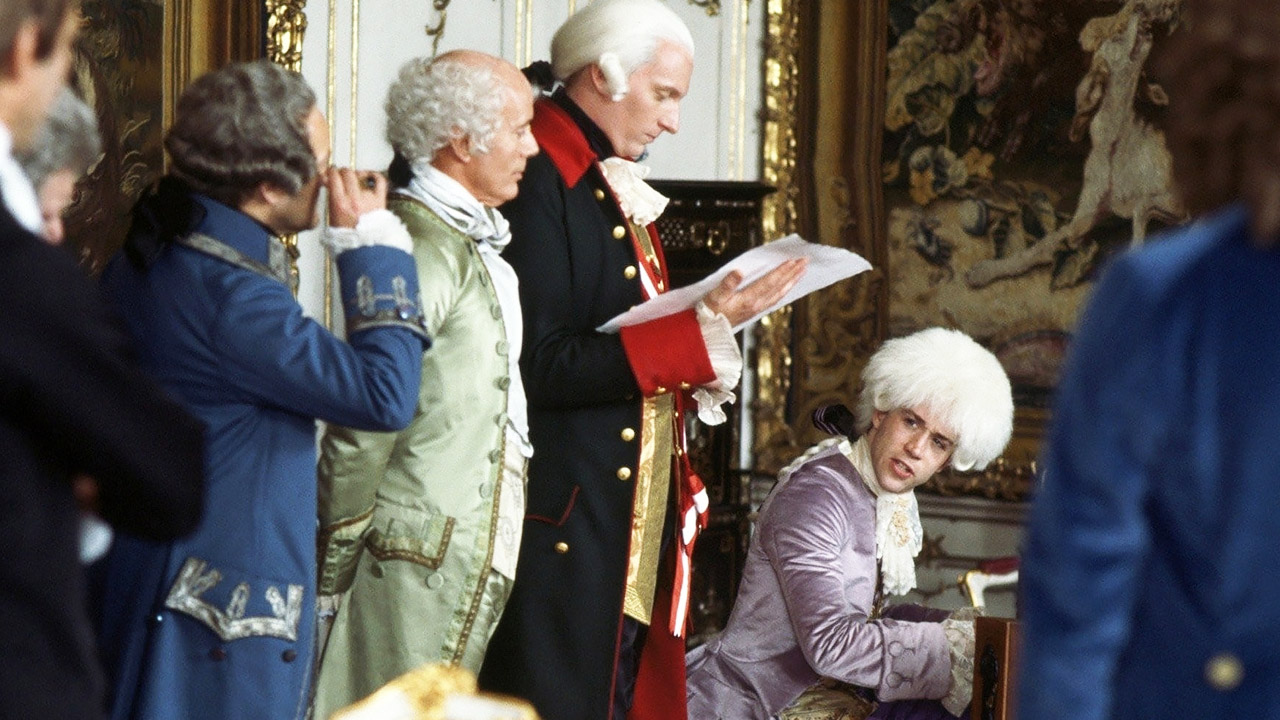Retrospective: 40 years on, the joyfully frisky Amadeus hasn’t aged a day

It’s the 40th birthday of the envy-fuelled, Best Picture-winning Amadeus, and Luke Buckmaster reckons its tale of mediocrity striving against divine greatness holds up just fine—even if you’re indulging in the extended, three-hour-long director’s cut.
Miloš Forman’s fabulously ostentatious film about Mozart and the lesser known composer Antonio Salieri unfolds not from the perspective of a character per se but of an emotion: jealousy. Salieri (F. Murray Abraham) is in the throes of the green-eyed monster’s grip—his eyes, mind, soul burning with spectacularly corrosive envy. We learn that from a very young age Salieri longed to achieve musical brilliance, in one early scene staring at a crucifix as a pipsqueak and praying for God to “make me a great composer.”
But for every truly amazing artist, a zillion other talented folk live in their shadow, certain to never reach the same place in the stars. Forman’s rightly lauded 1984 classic is no dry or stuffy period piece: this long, colourful, splashy drama bubbles with emotions and has an intoxicating punch-drunk spirit. It turned 40 this year but Amadeus doesn’t seem to have aged a day, spritzy like freshly popped champagne.
The story is fictional but Salieri was a real composer, described by The New Yorker as “one of history’s all-time losers—a bystander run over by a Mack truck of malicious gossip.” In 1830 Alexander Pushkin wrote a play, Mozart and Salieri, based on a rumour going around that Salieri had poisoned old mate Wolfgang. That play inspired another, Amadeus, written by Peter Shaffer in 1979, which Forman (best known for adapting One Flew Over the Cuckoo’s Nest) then brought to the screen.
Many films explore artistic greatness, but Amadeus takes an unusual approach: it’s about dealing with greatness when it’s not your own—and a cautionary tale about the dangers of defining yourself through other people.
Salieri is the narrator, recounting events to a young priest who visits him in a psychiatric hospital in 1823, encouraged to atone for his sins. Salieri is sent there in the opening reels, institutionalised after his servants hear him scream about how he murdered Mozart before attempting to take his own life.
Salieri whisks through his early years and upbringing, soon arriving at the point where, as an adult, he tracks down his idol and is aghast to discover the great man is an impish, gibbering, cheerfully lowbrow jokester. In Salieri’s words Mozart is “a giggling dirty-minded fellow,” making his phenomenal talents even harder for the protagonist to deal with. There’s a point here about how art never defines the artist: the former may come from the latter but there can be a gaping disconnect between the nature of people and their creations.

As Salieri, F. Murray Abraham gorges on quiet, seething glances, polite but with a constellation of grudges projected in those peepers. Tom Hulce is a flamboyantly silly Mozart—a chatterbox and flibbertigibbet with an outrageous laugh. Salieri is convinced his “obscene giggle” is evidence that God is laughing at him, and rationalises Mozart’s talent as, surely, some great big cosmological mistake.
That talent is indeed unquestioned: while Mozart has little presence or gravitas in the traditional sense, his musical prowess understandably astonishes those around him. Hulce told The Guardian that John McEnroe was a character reference, because “I was looking for people who behaved in ways that meant you would never guess they had such divine abilities.”
The film is dotted with bursts of musical bravado, and smaller moments that resonate in lower keys. There’s a lovely scene, a bittersweet combination of loss and creation, set on Mozart’s deathbed, when Salieri helps him write his Requiem, jotting down the music flowing through his head, erupting for the viewer in claps and bursts. There Salieri is, so physically close to Mozart, perhaps emotionally close too, and yet so far away in talent and creative temperament—processing a gamut of emotions while in that ringside seat, observing a genius he’ll never have.
I first saw this film about 20 years ago, and watched the director’s cut this week—which was still great, although the pace did dip a little, perhaps the result of Forman adding 20 minutes to an already hefty runtime (now clocking in at just over three hours). But that’s a minor complaint: it’s a rollicking ride, joyous and frisky, dotted with memorable moments—sometimes quietly audacious, sometimes loud and strange, always showy in one way or another.






















